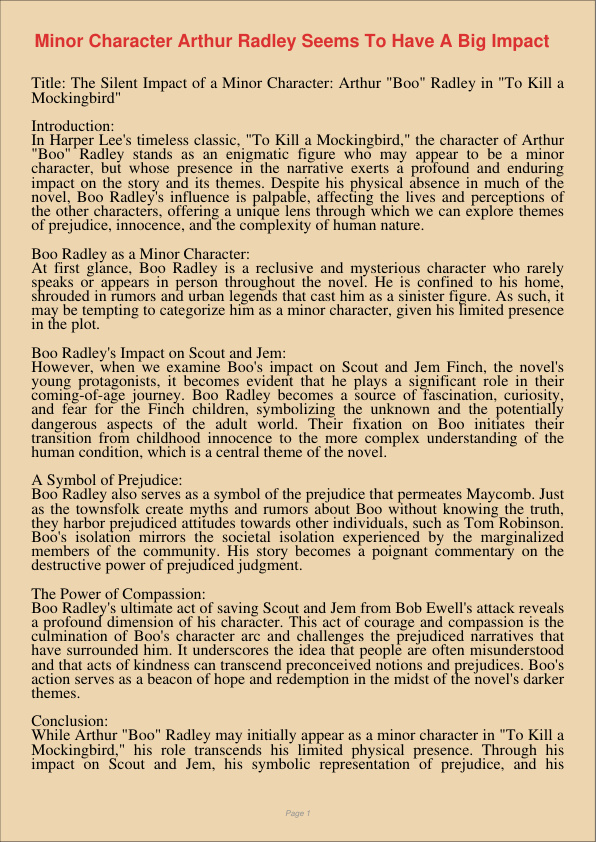Minor Character Arthur Radley Seems To Have A Big Impact
Dec 31, 2023
minor character arthur radley seems
big impact
Management
Biology

Title: The Silent Impact of a Minor Character: Arthur “Boo” Radley in “To Kill a Mockingbird”
Introduction: In Harper Lee’s timeless classic, “To Kill a Mockingbird,” the character of Arthur “Boo” Radley stands as an enigmatic figure who may appear to be a minor character, but whose presence in the narrative exerts a profound and enduring impact on the story and its themes. Despite his physical absence in much of the novel, Boo Radley’s influence is palpable, affecting the lives and perceptions of the other characters, offering a unique lens through which we can explore themes of prejudice, innocence, and the complexity of human nature.
Boo Radley as a Minor Character: At first glance, Boo Radley is a reclusive and mysterious character who rarely speaks or appears in person throughout the novel. He is confined to his home, shrouded in rumors and urban legends that cast him as a sinister figure. As such, it may be tempting to categorize him as a minor character, given his limited presence in the plot.
Boo Radley’s Impact on Scout and Jem: However, when we examine Boo’s impact on Scout and Jem Finch, the novel’s young protagonists, it becomes evident that he plays a significant role in their coming-of-age journey. Boo Radley becomes a source of fascination, curiosity, and fear for the Finch children, symbolizing the unknown and the potentially dangerous aspects of the adult world. Their fixation on Boo initiates their transition from childhood innocence to the more complex understanding of the human condition, which is a central theme of the novel.
A Symbol of Prejudice: Boo Radley also serves as a symbol of the prejudice that permeates Maycomb. Just as the townsfolk create myths and rumors about Boo without knowing the truth, they harbor prejudiced attitudes towards other individuals, such as Tom Robinson. Boo’s isolation mirrors the societal isolation experienced by the marginalized members of the community. His story becomes a poignant commentary on the destructive power of prejudiced judgment.
The Power of Compassion: Boo Radley’s ultimate act of saving Scout and Jem from Bob Ewell’s attack reveals a profound dimension of his character. This act of courage and compassion is the culmination of Boo’s character arc and challenges the prejudiced narratives that have surrounded him. It underscores the idea that people are often misunderstood and that acts of kindness can transcend preconceived notions and prejudices. Boo’s action serves as a beacon of hope and redemption in the midst of the novel’s darker themes.
Conclusion: While Arthur “Boo” Radley may initially appear as a minor character in “To Kill a Mockingbird,” his role transcends his limited physical presence. Through his impact on Scout and Jem, his symbolic representation of prejudice, and his ultimate act of compassion, Boo Radley becomes a central figure in the novel, offering profound insights into the themes of the story. His character reminds us that even the seemingly minor characters can leave an indelible mark on both the narrative and the reader’s understanding of the human experience. In the end, Boo Radley teaches us that true courage and goodness can emerge from the most unexpected places, challenging our preconceptions and enriching our understanding of the world around us.